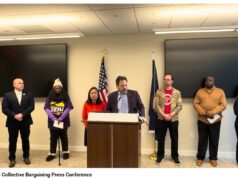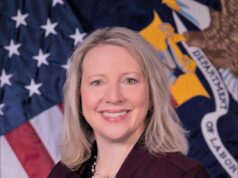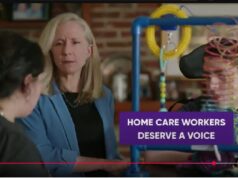From the labor coalition, “Stronger Communities. A Better Bargain”:
|
Virginia House Passes Bill to Give Public Service Workers the Freedom to Collectively Bargain
RICHMOND, Va. — The Virginia House of Delegates today passed HB 582, Delegate Elizabeth Guzman’s bill to give state and local public service workers the freedom to collectively bargain. “Workers in every locality in every corner of the commonwealth should have the freedom to collectively bargain,” said Delegate Guzman. “As one of only three states to ban public sector collective bargaining, Virginia is far behind the curve of history. It’s past time to give our teachers, firefighters, and other public service workers a voice so that they can advocate for the communities they serve.” “As teachers in the classroom we see the effects of 31 third-graders in a classroom or teaching positions staffed by a patchwork of substitutes because there just aren’t any teacher applicants to fill them,” said Dan Hale, an elementary school teacher in Fairfax County. “Collective bargaining will provide a forum in which employers and employees can join together to tackle such problems. This is not an ‘us vs. them’ scenario. Again, it is about working collaboratively for the betterment of all.” “A high turnover rate makes it hard to carry out our services for our clients, the juveniles that we serve,” said Julius Reynolds, a juvenile probation officer in Loudoun County who believes that if workers had a voice on the job through collective bargaining, retention rates would improve. “Most of us are forced to carry ungodly case loads and we’re forced to make decisions on crises that impact these families in almost a triage-type way … That should not be on the table when you’re dealing with families’ lives. These are not products that we’re pulling off a conveyor belt. If we make a mistake, we don’t get to go back and say, ‘Oh, I left a screw out, or a bolt out.’ You don’t get a second time to make a first impression with these families.” “Collective bargaining rights would change the game for us in Fairfax,” sixth-grade teacher Mary Wurl wrote in a recent op-ed in the Richmond Times-Dispatch. “I can already imagine all the ways our students could win as we advocate for them in a union contract: better student-teacher ratios, limits on standardized testing, effective ways of teaching English language learners, recruitment of teachers of color, and regulating special education teachers’ caseloads, to start. Solutions need the input of teachers — the people in schools who are in the closest proximity to students and who best understand their needs.” By allowing us the ability to meet with our localities management and address real concerns about workplace safety, benefit, and needed staffing and equipment, and signing a contract that both parties are held accountable to is long overdue in Virginia,” said Kurt Detrick, a career fire fighter in Portsmouth. “Remember that Virginia’s firefighters are the experts and we know what our communities need, “One of the biggest differences I noticed between Maryland and Virginia is the school climate,” said Rick Neave, who has taught in both states. “The climate in Maryland amongst educators was overwhelmingly more positive. Educators having voice on the job meant that they felt they were treated fairly and recognized for their hard work. Teachers’ working conditions are students’ learning conditions. When teachers feel respected and valued and are part of the decision-making process, they work even harder and their students reap the results.” “Collective bargaining gives teachers a seat at the negotiating table, a voice in the critical conversations about teaching and learning, and a shared responsibility for and ownership of establishing and maintaining a positive school climate and reaching every student,” said Larry Little, a Fairfax County public school teacher who has been an educator for 42 years. In a Washington Post op-ed, Richmond Mayor Levar Stoney wrote “Workers in the South were barred from bargaining collectively for the same reason that enslaved people were barred from learning how to read. Because people in power know there is power in numbers. United we bargain, divided we beg.” His piece concluded, “we can make history by shaking this vestige of Jim Crow that hangs over this commonwealth. It’s past time to give our workers the dignity of a voice and a seat at the table.”
|
|
###
Authorized by “Stronger Communities. A Better Bargain”, a coalition comprising Virginia AFL-CIO; The American Federation of State, County and Municipal Employees (AFSCME); The American Federation of Teachers (AFT); The Communications Workers of America (CWA); Service Employees International Union (SEIU); Virginia Education Association (VEA); The Virginia Professional Fire Fighters (VPFF) and The United Food and Commercial Workers (UFCW) Local 400. |










![Video: Rep. Suhas Subramanyam (D-VA10), Who Was in the Room for Ghislaine Maxwell Deposition, Says She Was “robotic,” “unrepentant,” a “monster [who] should be behind bars forever”](https://bluevirginia.us/wp-content/uploads/2026/02/suhas0209-100x75.jpg)

